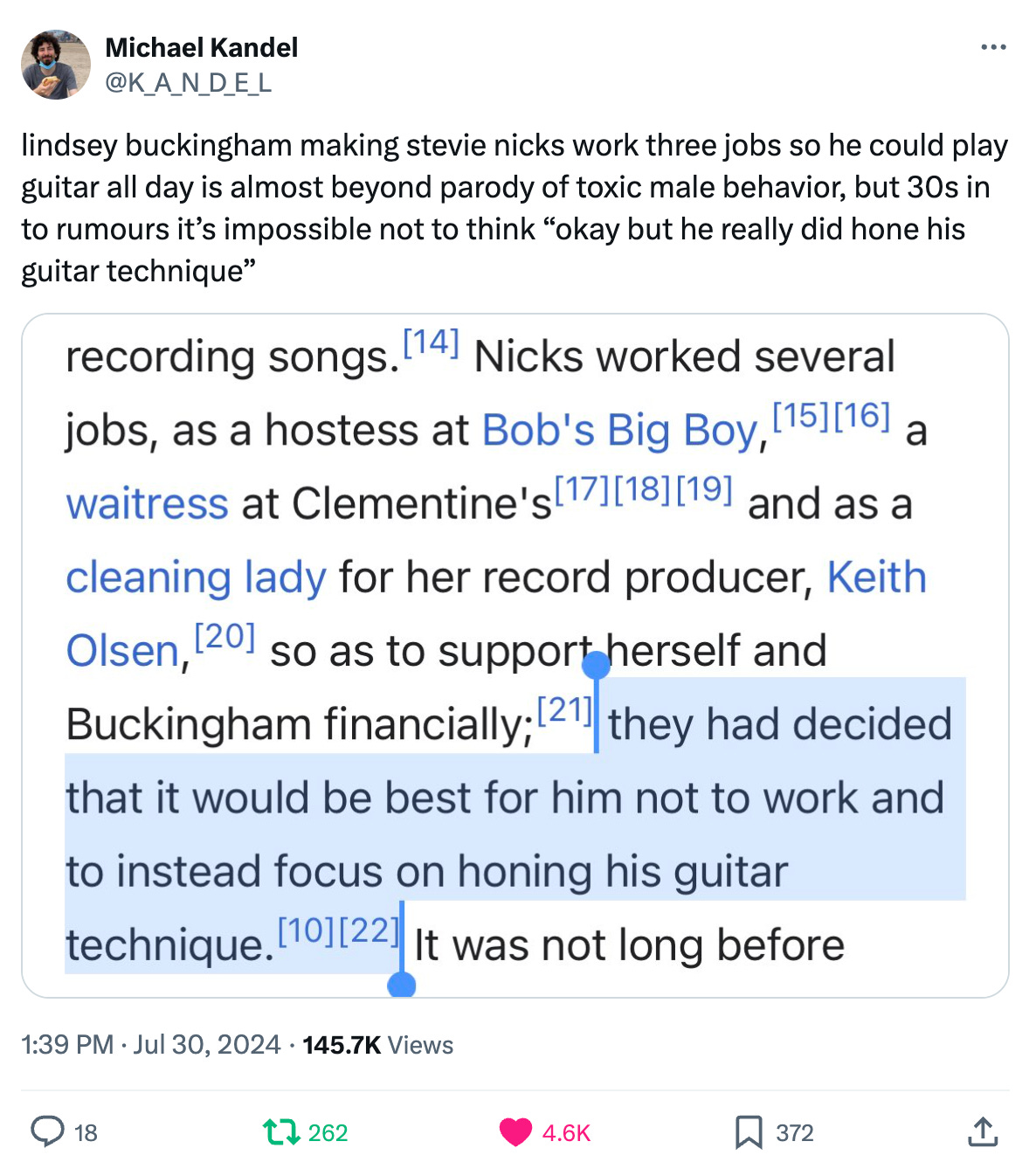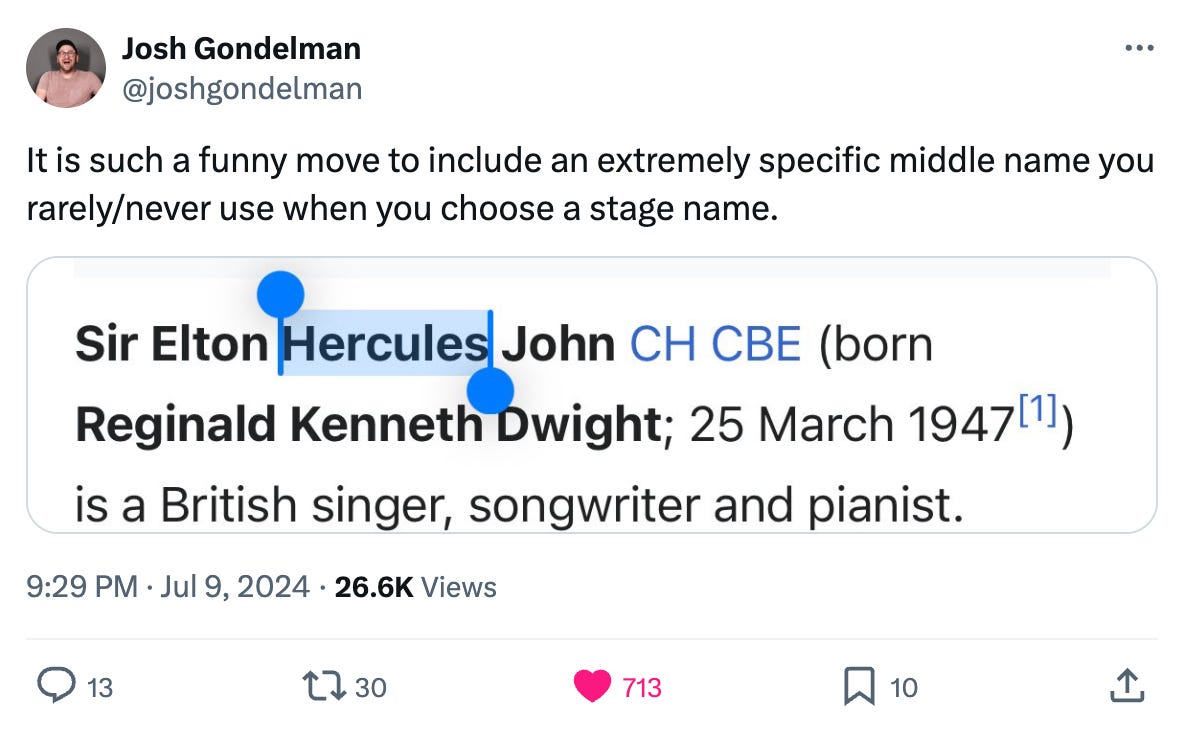UMG's Dying, Sinatra's Thriving, and George Bush's Niece Has a Weird Name: Link Drop
The news, podcasts, albums, and stories that I've enjoyed in the last month.
Can’t Get Much Higher’s link drop is a monthly series for paid subscribers where I discuss art, news, and stories that have gotten me thinking and laughing in the last 30 days. This month, we dive into Universal Music’s poor stock performance, a heartfelt message from Eric Clapton, why strip clubs need to pay their licensing fees, The Beatles’ lost video game, and so much more.
Links, Links, Links
Musical Trends to Keep an Eye On
“Why I Finally Quit Spotify” by
(The New Yorker)Chayka, who recently published the book Filterworld: How Algorithms Flattened Culture, recently put out this piece about why he stopped using Spotify. Chayka highlights many complaints that I’ve heard over the years. Spotify’s user interface is confusing. Spotify makes it hard to find the music you’ve saved. Spotify prioritizes algorithmic content over editorial curation.
I agree with some of these notions — and I’m hoping to write a bit more about them in the future — but I think a bubbling backlash against Spotify is interesting given that they just announced record profits. Both of these things can be true, though. Spotify moving towards cheaper forms of audio, like podcasts and audiobooks, can increase margins while also alienating long-time users who came to the platform for music.
“MPC Stems goes standalone, bringing on-device stem separation to the Akai Pro MPC One, Live, X and more” by Matt Mullen (MusicRadar)
Discussions around AI technology and music are usually focused on text-to-song technology, like Suno and Udio. But I think the most exciting AI-related technology is stem-splitting. This allows users to extract individual instruments from recordings, which can then be used for sampling and remixing. Previously, this was done imprecisely by using clever equalization and processing. But AI has made it as easy as clicking a few buttons. Akai is now making this technology even more accessible by adding it to their MPC, maybe the most famous sampler/sequencer of all-time. I expect this to lead to a tremendous amount of creativity.
“Country Music Is Booming Again. This Time, the Fans Are in Charge.” by Neil Shah (The Wall Street Journal)
Look back to the 1970s and 1990s and you’ll find other periods where country music crossed over into the mainstream. Though country has been surging for the last few years on the backs of artists like Morgan Wallen, its popularity has reached new levels in the last few months. Not only has every artist from Beyoncé to Machine Gun Kelly put out country songs, but country stars are becoming legitimate pop stars. I’m interested to see how long this will last. Post Malone putting out a country album feels like the sign that we have reached peak-country.
Online Posts that Gave Me Life
Listen & Enjoy
Francis Albert Sinatra & Antônio Carlos Jobim by Frank Sinatra and Antônio Carlos Jobim
As one of the most well-known musicians of the 20th century, it’s impossible to say that Frank Sinatra is underrated. Still, I don’t think he gets enough credit for how adventurous he was musically. This collaborative album with Brazilian guitarist Antônio Carlos Jobim is a great example. It’s a bossa nova album, a style Sinatra had never really explored before. 25 years into his career he could have rested on his laurels. But he didn’t. He kept exploring new styles.
News from Outside the Music World
“AI models collapse when trained on recursively generated data” by Ilia Shumailov (Nature)
New research found that when you train AI models on the data they generate, it causes “irreversible defects in the resulting models.” What this means is that if the internet becomes filled with AI-generated slop and new models are trained on that slop, then the models will start to suck. In other words, ChatGPT won’t be able to replace humans completely. The final sentence in the paper’s abstract provides a nice summary:
Indeed, the value of data collected about genuine human interactions with systems will be increasingly valuable in the presence of LLM-generated content in data crawled from the Internet.
“A Windows version from 1992 is saving Southwest’s butt right now” by Jacob Roach (Yahoo!)
Last month, a software update from the cybersecurity firm CrowdStrike led to massive tech outages. These were so widespread that every airline had to ground their flights. Well, almost every airline. Southwest was able to keep flying because they were reportedly running Windows 3.1, a 32-year-old operating system.

“Amazon Paid Almost $1 Billion for Twitch in 2014. It’s Still Losing Money.” by Salvador Rodriguez (The Wall Street Journal)
A decade ago, Amazon purchased Twitch, the live-streaming platform that is very popular in the videogame community. They’re still losing money. Problems stem from the fact that live-streaming is expensive, content moderation is hard, and advertisers aren’t as keen to work with longform video. The Wall Street Journal reports that employees fear Twitch might become an Amazon “zombie brand,” meaning “internal projects or acquisitions that have been sidelined because they haven’t lived up to expectations.” Employees pointed to Goodreads, the online reading platform as a good example of this.
News from Inside the Music World
“Boosie Badazz Wins $21K Settlement After Suing Florida Nightclub” by Caroline Fisher (HotNewHipHop)
Believe it or not, nearly every public establishment that you go to that is playing music in the background technically needs to be paying performance royalties to songwriters. And that includes strip clubs!
Keep reading with a 7-day free trial
Subscribe to Can't Get Much Higher to keep reading this post and get 7 days of free access to the full post archives.








